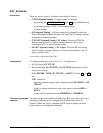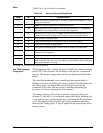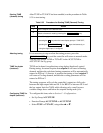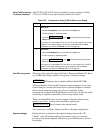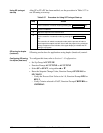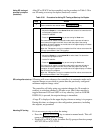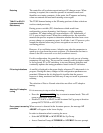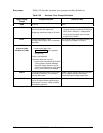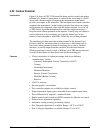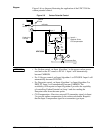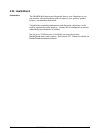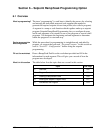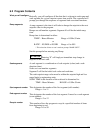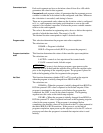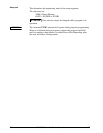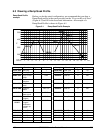
202 UDC 3300 Controller Product Manual 4/00
5.22 Carbon Potential
Introduction
Figure 5-6 shows a UDC 3300 controller being used to control the carbon
potential of a furnace’s atmosphere. A carbon probe consisting of a ZrO2
sensor and a thermocouple (to measure the temperature at the sensor)
provides two inputs to the controller. The microprocessor-based controller
computes the atmosphere’s actual carbon potential from these two inputs
and compares the computed value with the desired setpoint. As an on-off
or PID control algorithm determines the controller output necessary to
keep the actual carbon potential at the setpoint. Usually only one output is
used to add more or less enriching gas (typically natural gas) to the
furnace’s base atmosphere, which has a relatively low carbon potential.
The enriching gas then raises the carbon potential to the desired level;
however, there are occasions when it is necessary to add dilution air to
lower the carbon potential instead of enriching gas to raise it. In those
instances, a second output from the controller provides this function.
When proportional control is used, a different set of PID tuning constants
is used for the dilution air than those used for the enriching gas.
Features
• Direct calculation of carbon percentage with seven different
manufacturers’ probes
– Advanced Atmosphere Control Corporation (AACC)
– Corning
– Cambridge Instruments
– Marathon Monitors
– Furnace Control Corporation
– MacDhui (Barber Colman)
– Bricesco
• ± 0.02 % accuracy
• No nomographs—no mistakes
• Two controller outputs are available for duplex control.
• Probe temperature input type is selectable from complete input menu.
• Three different local setpoints—standard feature
• Duplex control with second set of PID constants for dilution air control
• Process factor adjustment capability
• Automatic sooting warning via flashing display
• New Dewpoint algorithm is available. Range: –50 °F to +100 °F
• New % Oxygen algorithm is available. Range: 0 % to 40 %



